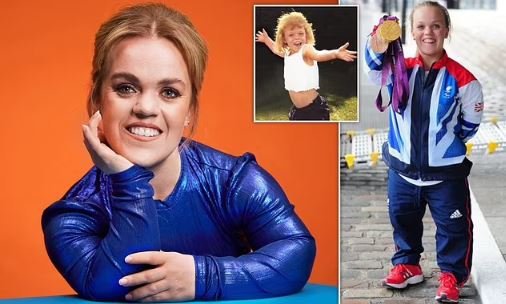My mother gave me away after finding out I had dwarfism – Ellie Simmonds speaks on meeting her mum after 28 years
Five-time Paralympic gold medallist, Strictly contestant, TV presenter and disability campaigner – Ellie Simmonds has never let her dwarfism define her.
But behind that confident, successful facade, Ellie has always had questions about her very early life when she was put into foster care straight after birth before being adopted.
‘My life’s been amazing and I have a loving family who taught me never to let my dwarfism hold me back,’ she says.
‘But the start of my life was a different story. Although I’ve always known I was adopted it was something I knew very little about, and I’ve never wanted to ask why until now.
‘I went straight into foster care at ten days old, and the last time my birth mother saw me was at two weeks. I didn’t know anything about what she went through.’
Ellie, the youngest of five who grew up with adoptive parents Val and Steve in Walsall, West Midlands, was born with achondroplasia, the most common form of dwarfism.
She enjoyed pony riding and ballet dancing but it was swimming that captured her heart at the age of five, and three years later she was racing at the same pace as able-bodied peers.
She was just 13 when she became a national hero after winning two golds for Britain at the 2008 Paralympics in Beijing. She retired from sport in 2020 and it was then that she felt an urge to trace her roots.
Her journey, told in the new ITV documentary Ellie Simmonds: Finding My Secret Family, is searing and painful at times as Ellie explores the relationship between disability and adoption.
‘I’d achieved everything I wanted to,’ she says. ‘And then without the pressures of being an athlete, I had the time and space to find my birth parents.
‘All my life I’ve had so many questions and I’ve often wondered if my birth mum looks like me.
‘I didn’t want to leave it too late and I’m going into a new chapter of my life. I’m starting to think about settling down myself,’ reveals Ellie, whose partner Matt Dean, who also has dwarfism, is a childhood friend whose parents introduced her to swimming as a toddler.
‘It’s the perfect time to find out who I am and where I started from.’
As she delves into systemic bias and lack of awareness around disabled children, she hears shocking revelations. But she refuses to judge her birth mother, who already had a daughter without dwarfism.
‘When I was born, despite reassurances from medical staff that I was normal, she was convinced there was a problem,’ says Ellie, 28, who’s traced her official adoption files and photos that had been locked away for 27 years.
‘A few days later the hospital confirmed I had achondroplasia and my mother told the midwife she felt she wasn’t bonding with me.
‘Then, after saying it would be best for me to live with a foster parent for a short time, she requested I be put up for adoption just two days later.
‘Two days isn’t a long time to make a monumental decision like that. But she was a single parent so you have to try to put yourself in her shoes.
‘It sounds like she had a fear of not just me, but of living with dwarfism. If I was average height, like my older birth sister, would I not have been adopted?’ Ellie says
Reading the notes taken by medical staff at the time of her birth, Ellie discovers that her mother, who’d separated from her father before she found out she was pregnant, felt guilty about her daughter’s disability and wished she’d had an abortion or that her baby had died.
‘It’s very hard, isn’t it? You’d hope that whether your child is different or not, you’d still stick with it because there’d still be that love.
‘I’m just small. It’s never affected me emotionally before, it’s never made me feel rejected, thinking why did my birth parents not want me?’
Ellie reads the fact sheet given to her birth mother at the time, describing how people with achondroplasia ‘tend to be muscular and acrobatic, which perhaps is the reason they have traditionally been involved in the circus’, and that they have to ‘deal with being stared at and laughed at by other children’ and, incredibly, that some are ‘evil’ and ‘stupid’.






















